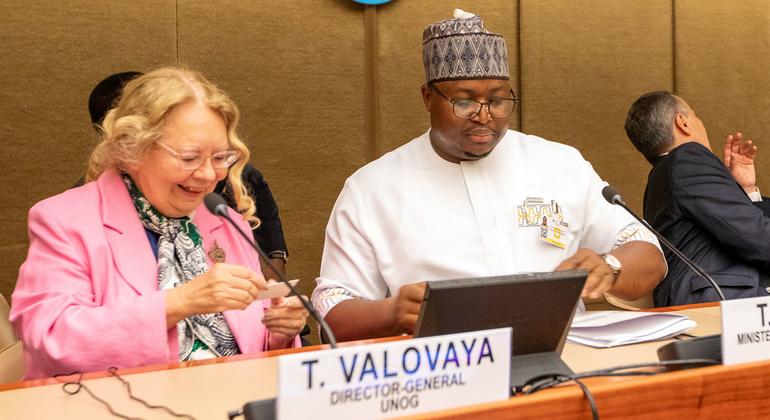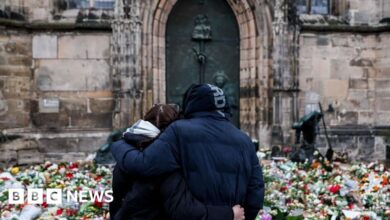Geneva Convention: The ‘rules of war’ that saved me, says former child soldier

“I stand here today as a former child soldier, forcibly recruited in a civil conflict that massacred more than 50,000 of my fellow countrymen… I would not be the person I am today without the vital support of the ICRC and the international community.,” Musa Timothy Kabba told members of the Security Council gathered in Geneva on Monday, referring to its United Nations counterpart the International Committee of the Red Cross, which was founded in the Swiss city in 1863 to protect and provide humanitarian assistance under treaties designed to protect people in conflict.
Speaking at a forum held at the UN headquarters in Geneva to mark the year 1949 when the international community revised three previous conventions – relating to the protection of soldiers wounded in action, victims of conflict at sea and prisoners of war, and added a fourth to protect civilians affected by war – Mr Kabba said he “didn’t need to be reminded of the trauma of those years” as a young soldier.
“But today, in this birthplace of modern global humanitarianism, I must acknowledge that it was the ICRC that helped me overcome… the trauma of my war experience and reintegrate into normal society,” following the country’s civil war in the 1990s, “in which most of the basic principles of the Geneva Conventions were violated”.
‘Moral Beacon’
From Mozambique, the Permanent Representative to the United Nations in New York, Pedro Comissario Afonso, stressed that the Geneva Conventions are “moral beacon and legal compass during and after armed conflict in our country”, which took place from 1977 to 1992.

The international humanitarian law contained in these documents “should guide not only the actions of the parties involved in the conflict but also of humanitarian organizations working tirelessly to alleviate the suffering of the Mozambican people,” he continued.
The representative of Mozambique continued to say that the burden of the Convention on Legal and Institutional Standards Relating to Armed Conflict persists in the Government’s approach to confronting non-State armed actors responsible for terrorist attacks in the north of the country.
Resolving Elusive Conflicts
Representing host country Switzerland, Foreign Minister Ignazio Cassis compared the historic milestone to an “alarming” international context.
“More than 120 armed conflicts are taking place around the world.“There is Sudan, where ceasefire talks have been held in recent days. There is also Ukraine, Yemen and the Middle East, to name just a few of the current conflicts that neither multilateralism nor international law can avoid, let alone resolve.”
In his call for increased support for warring parties to respect international humanitarian law (IHL) with the aim of limiting the impact of armed conflict, Mr. Cassis stressed that it is “not simply a right inscribed on the paper of our clear conscience, nor even a right à la carte; must have the right to act. Our voices must be strong and convincing enough so that their echoes can be heard on the battlefield.”.
‘There is no reason to celebrate’
While the forum heard about the worrying trend among some states to argue for exemptions from clearly defined limits on what is legally permissible in war, ICRC President Mirjana Spoljaric Egger stressed that there was “no reason to celebrate” the blatant disregard shown by many states for the Convention.
Ms Egger stressed that countries should use their “influence and power” to enable independent and neutral humanitarian organisations to play their role.
The ICRC President also highlighted the changing nature of modern warfare, which poses another challenge to international humanitarian law – and the global community’s efforts to limit its impact: “States must insist that the use of new warfare technologies, artificial intelligence, cyber operations, information operations strictly comply with IHL and, more specifically, States urgently need to develop a normative framework imposing certain limitations on autonomous weapons systems.”
Global Center
For the United Nations Geneva, Director-General Tatiana Valovaya noted that “even if the Conventions are violated” in conflicts around the world, they remain of fundamental importance, “because They allow us to remind people that war has rules, and even war has limits.”.
Expressing a broad general call for greater engagement by all governments in international humanitarian law, Andrew Clapham, Professor of International Law at the Graduate Institute of Geneva, told delegates that violations of the Geneva Conventions “are not just technical issues that others can address”.
Millions of lives saved
It is not only the responsibility of International Criminal Court (ICC) or International Court of Justice (International Court of Justice), humanitarian workers or the Red Cross to ensure the protection of civilians or facilitate access for aid workers, he stressed.
“Violations of the Geneva Conventions must be part of the daily diet of State representatives working for peace and security.; taking reports of violations of the Geneva Conventions seriously will put you on the path to peace and conflict prevention.“ .
On a more positive note, ICRC Legal Director and Head of Legal Affairs, Cordula Droege, asserted that “every day, even in the harshest conflicts around the world, international humanitarian law is indeed being respected in countless cases”.
Actions to comply with the Geneva Conventions, which often go unreported, “can save lives, protect dignity and ensure humanitarian access,” she said. “And over the decades, there can be no doubt that the Geneva Conventions have saved millions of lives.”




